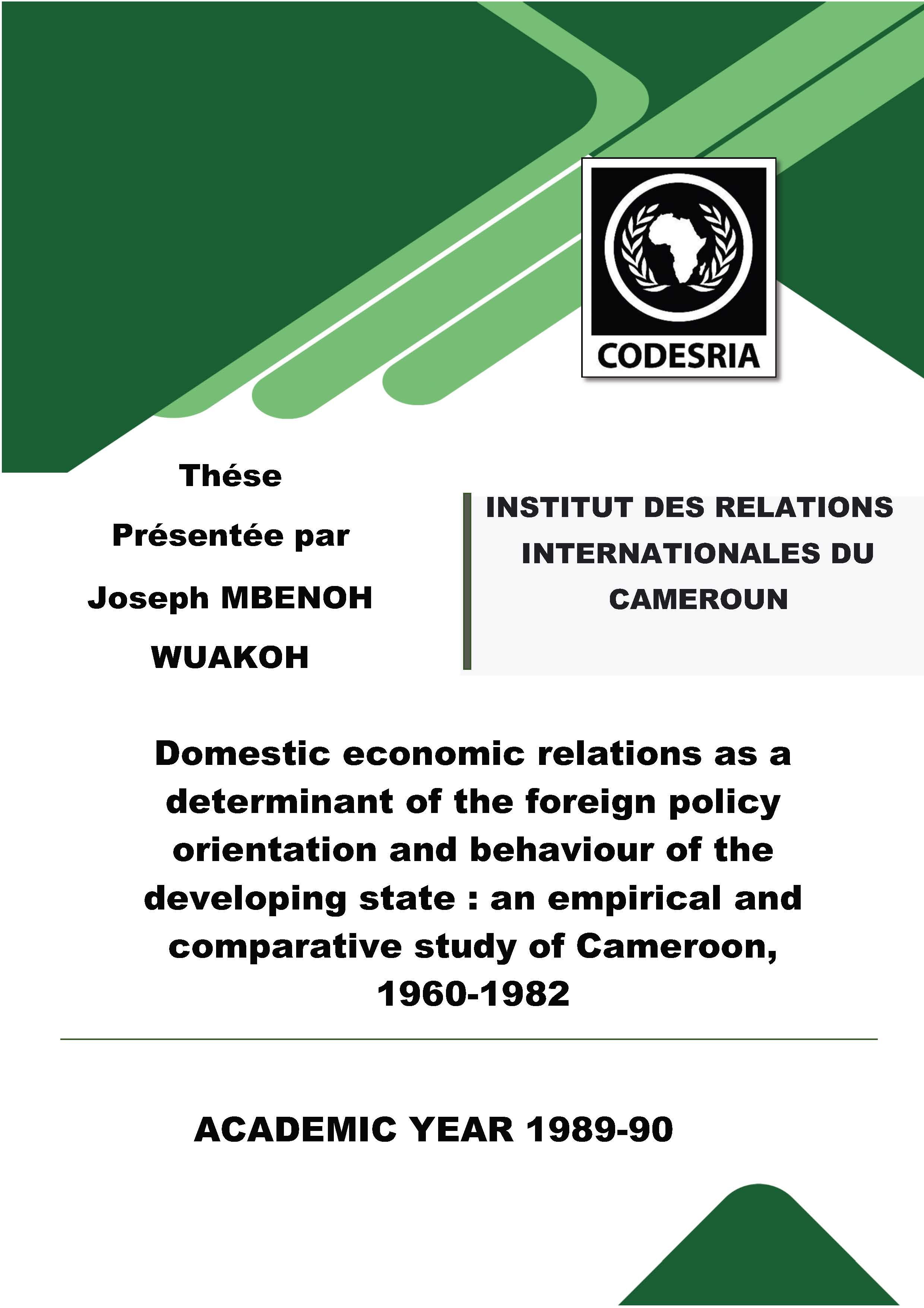Domestic economic relations as a determinant of the foreign policy orientation and behaviour of the developing state: an empirical and comparative study of Cameroon, 1960-1982
Keywords:
Domestic economic, policy, developing state, study, Cameroon, 1960-1982Synopsis
This dissertation seeks to examine the· effects of economic (under), development on the foreign policy orientation and/or behaviour of the developing state drawing from the Cameroonian experience between 1960 and 1982 as a case study. Foreign policy analysis has in most cases consisted in a critical examination of those actions, inactions, reactions and proposals for action of astate in relation toits external environment. Therefore, the primary purpose of foreign policy analysis has been to identify and explain the basic variables which determine a state's behaviour in relation toits external environment.
Although foreign policy analysis has produced a group of theories (the credibility of which is now generally established) such as bureaucratie politics, misperception, groupthink and cybernetic decision-making, no single overaching theory of foreign policy has emerged. Given the so-called "primacy of domestic policy", most of these theories have focused on the organizational structure of the Foreign Ministry or the other departments of government, or on the political processes of foreign policy or the relationship between the domestic political structure and foreign policy. Such an orientation has, in most cases, taken the form of a mere description and analysis of how the political decision-making and institutions work and how their working affects foreign policy. Thus, in these theories emphasis is placed generally on the role of ·the most important decision-makers, the nature of their influences on the purposes of policy formulation and execution as a whole, the identification and examination of such component processes as the · source and nature of stimuli, the amount and quality of information and how it gathered and transmitted, the channel and directions of communication and how the information flow affects decisions, the process of policy formulation and the political factors within the domestic and external environments which impede or assist policy execution. By focusing on how the different units of the international political system communicate or interact, such theories
have been anchored on the assumption that the domestic political setting of the state itself - the political society and culture, the political resources and capability of the state, the social and political or para-political groups and elites, the public opinion and mass media and the general political climate of the state - is the most important determinant of foreign policy. In this way, the economic foundation of the foreign policy of the developing state in these theories has either been under-emphasized or completely left out of analysis.
Nevertheless, with regards to the foreign policy of the developing state, the theories have serious drawbacks since fully formed institutions are either rare or totally absent. The dominance of "power politics" theories which relegate economic factors to a peripheral status accounts for the prominence these theories give to the politics and administration of diplomacy. Thus, even in their attempts to root the study of foreign policy in the inter-connection between the internal and external environments, the
significance of the economy has not been given the attention it deserves. Indeed these theories treat the elements that constitute the internal environment in their foreign policy models as autonomous entities shaping the perceptions of policy-makers. Eventhough conflicts are not seen as representing the driving force for decisions such conflicts are not located in the economic foundation of the state and society. The impression is created that the field of foreign policy is wide open for all the competing elements in the domestic environment, irrespective of the positions they occupy in the ownership structure of the economy. In this perspective, these theories in their search for the existence and role of political forces focus erroneously on
the peripheral issue - areas of security and high diplomacy often because this is the area in which reputed theories on the foreign policies of developed industrialized states have stressed.
The basic postulate of our investigat~ons in this study, therefore, is that economic factors to a very large extent shape or determine the foreign policy orientation and/or behaviour of the developing state because most of its external transactions occur in the issue-area of economic exchange traditionally described as "low politics". Anchoring the study of foreign policy on the economy, therefore, brings out in bold relief the social and political forces that influence not only the operations of the
economy but also the orientation and parameters of foreign policy itself. The domestic and external agencies and forces that the decision-making theorists analyze get a concrete, materialist expression by unrave.lling the manner in which human beings reproduce their lives on a daily basis.
The basic relationships-are necessarily contradictory since they determine the way in which social wealth is produced, distributed and consumed and set the basis for the development of society. Through foreign policy, the state is forced to call on foreign resources to support the national economy and politics. Political parties, interest groups, international organizations, social movements, business cartel, media organizations, etc, develop having a direct or indirect relationship with the contending forces in foreign policy.
Downloads
References
James Caporaso; "Introduction to the Special Issue of International Organization on Dependenëe and Dependency in the Global System" in International_Organization, vol. 32, N° (Winter 1978), p. 2
Frederick Cooper; "Africa and the World Economy", Paper commissioned by the social science Research Council for presentation to the African studies Association Annual Meeting, Bloomington, Indiana, October 1981, p. 6
See Raymond Vernon; Sovereignti at Baf (New York, Basic Books, 1971), pp. 65, 112; àîid R. Bernon; "International Investment and Iniernational irade in the Product Cycle'' in John H. Dunning(ed); International Investment (London, Penguin Books, 1972), pp. 305-325.
Antola; "The European Community and Africa: A Neo-Colonial Model of Development" in Peace and the Sciences (Vienna), N° 4 (December, 1976), p. 29






